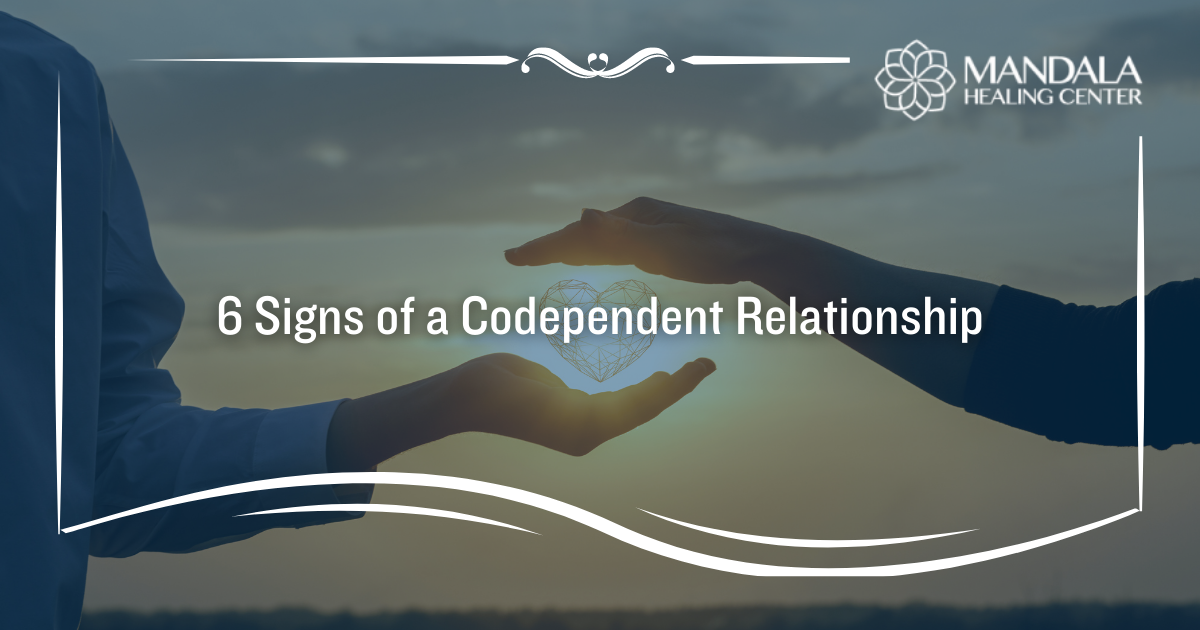Codependency is an emotional and behavioral state where people rely on another person for support and self-esteem. Oftentimes, in a codependent relationship, one person sacrifices their needs and well-being for the sake of the other. This relationship trope is common among people who have a partner suffering from an addiction.
Some estimates suggest that over 90% of people in the U.S. demonstrate codependent behavior.
While it is normal to rely on your partner in some aspects, codependency is characterized by an unhealthy reliance on another individual. Codependency is often a way to obtain self-esteem and feelings of safety in a manner that robs you of your own identity and independence. Codependent behavior can be highly damaging to your relationships and overall mental health.
If you are worried that you might be in a codependent relationship, look out for the 6 most common signs:
1. You Have Low Self-Esteem
When you have good self-esteem, that means you view yourself and the way you healthily fit into the world. However, when you are in a codependent relationship, you begin to equate your worth with meeting your partner’s approval and needs. In other words, your self-esteem is low because you rely on someone else to define it.
If your self-worth depends on what your significant other thinks of you or you often find yourself trying to impress or help your significant other at the expense of your own needs, you are most likely in a codependent relationship.
2. Your Relationship Defines Who You Are
Do you have a hard time recognizing your interests outside of your relationship? Does your life revolve around being with your partner and spending time with them? If so, you might be in a codependent relationship.
Codependency will cause you to think about nothing else besides your partner and your relationship with one another. Instead of valuing your own talents, achievements, and qualities, your personality and self-worth are tied to how well your relationship is going. If you find that your relationship seems to define who you are as a person, you are suffering from codependency.
3. You Struggle With Abandonment Issues
One of the main characteristics of codependent relationships is a strong fear of being abandoned. Oftentimes, people suffering from abandonment issues have a hard time recognizing their fear of being alone.
Signs that you struggle with a fear of abandonment include:
- Being overly sensitive to criticism
- Having a hard time trusting others
- Difficulty making friends unless you are sure they like you
- Taking extreme measures to avoid rejection or separation
- A pattern of unhealthy relationships
- Getting attached to people quickly
- Having a hard time committing to relationships
- Working too hard to please another person
- Blaming yourself when things do not work out
- Staying in relationships even when they are unhealthy to avoid being alone
If you find yourself giving and giving just to feel wanted, loved, and secure, you are most likely in a codependent relationship.
4. You Have a Hard Time Being Alone
If you have ever found yourself staying in relationships that are not quite giving you what you need, you could be suffering from codependency. Oftentimes, people in codependent relationships stay even when they know the partnership isn’t good for them to avoid being alone. This is because being in an unhealthy relationship feels better to them than not having a significant other to validate them.
Even further, if you find yourself jumping from one relationship to another without giving yourself some time to be alone, you are displaying codependent behavior.
5. You Find Yourself Trying to “Fix” Your Partner
One of the most common signs of codependency is wanting to “fix” your partner. Instead of recognizing that your husband or wife has personality traits that are incompatible with you, you continuously attempt to change that person to meet your needs, which displays an inability to realize that it is not your job to fix other people.
For example, let’s say your partner has a serious spending problem due to unresolved issues in the past. You recognize that their financial issues are tied to a deeper issue, which causes you to feel like you are the one who can save them from their unhealthy coping mechanisms. Instead of allowing the person to go through their own personal growth, you are attempting to fix things for them.
Trying to fix others is a trademark sign of codependent relationships. One person begins doing all of the work to make the relationship work, whether the other individual is putting in effort or not.
6. You Cancel Plans to Spend Time With Your Partner
If you are in a codependent relationship, you have likely sacrificed time with friends and family to be with your wife or husband. This usually stems from a fear that if you spend time on the things you are interested in, you will miss out on time with your partner. Instead of acknowledging that you and your partner have different lives, responsibilities, and interests, you begin attempting to spend every free moment you have with them.
Routinely canceling plans to spend time with your partner is a clear sign of codependency. It is healthy to have hobbies and interests outside of your relationship, as this allows you to have a separate and personal identity.
Find Support for Codependency
Codependent relationships can take over your life, causing you to have no identity, interests, or free time outside of your significant other. Codependent behavior often stems from living with an addicted loved one, unresolved trauma, or diagnosable mental health conditions like anxiety or personality disorders.
To learn more about codependency and receive support from a professional, contact Mandala Healing Center today.












